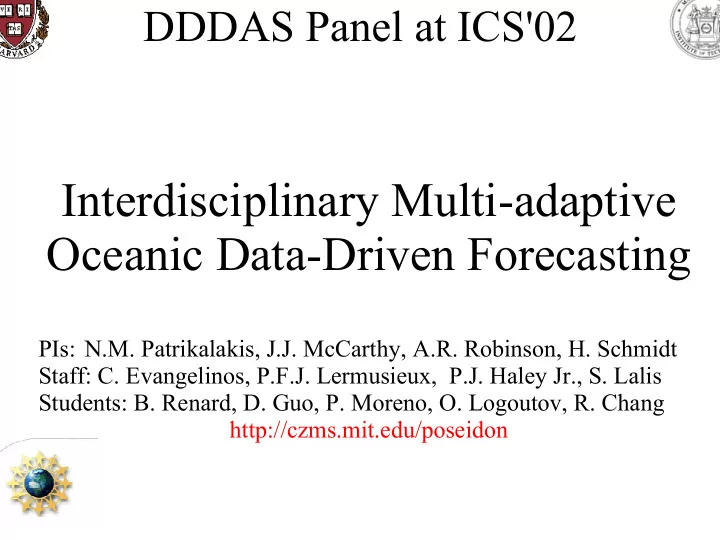

DDDAS Panel at ICS'02 Interdisciplinary Multi-adaptive Oceanic Data-Driven Forecasting PIs: N.M. Patrikalakis, J.J. McCarthy, A.R. Robinson, H. Schmidt Staff: C. Evangelinos, P.F.J. Lermusieux, P.J. Haley Jr., S. Lalis Students: B. Renard, D. Guo, P. Moreno, O. Logoutov, R. Chang http://czms.mit.edu/poseidon
Ocean Science and Data Assimilation ● Field and remote observations ● Models: – Dynamical – Measurement – Error ● Assimilation schemes ● Sampling strategies ● State and parameter estimates
Applications ● Pollution control – Outfalls – Spills – Harmful algal blooms ● Resource exploitation and management – Fisheries – Oil platforms ● Maritime and naval operations, law enforcement
Pollution Control: Harmful Algal Blooms
Resource Exploitation: Fisheries
Maritime and Naval Operations: Egypt Air crash (10/31/1999) Egypt Air Flight 990 - Floating Debris Dispersion southern (left) vs. northern (right) impact point
Background: Physical-Biological Oceanography in HOPS ● Primitive Equation (PE) dynamical model ● Multiple biological models ● Optical dynamical model ● Interface with ocean acoustics ● Assimilation for physics, acoustics and biology
Background: Ocean Acoustics ● Study of reflection, scattering and transmission loss ● Interface with physical oceanography (sound speed) ● Parabolic equation, ray propagation, normal mode and wavenumber integration based dynamical models ● Propagation characteristics help estimate physical vars. ● Scattering characteristics help estimate biological vars.
Current Work and Plans ● Data Assimilation and Error Estimation: – Operational real-time Error Subspace Statistical Estimation (ESSE): physics-biology-acoustics – Error metrics for quality control, adaptive modeling and sampling ● Advanced Models: – Adaptivity: ● Biological Oceanography: Dynamical Models ● Physical Oceanography: Adaptive Primitive Equation terms – Interactions: ● Physical Oceanography with Acoustics ● Acoustics with Biological Oceanography ● Distributed Computing Infrastructure and Web User Interface
Error Subspace Statistical Estimation ● Improved forecasts (with a reliable model) ● Dynamically forecasted error ● Ensemble forecasts (Monte- Carlo approach with full nonlinear model) ● In addition ESSE provides: – Most significant variability modes – Statistics for variability, predictability, model error – Multivariate, multiscale correlations
Use of ESSE Assimilation in Coupled Simulations Aug.-Sep. 1998 Mass. Bay experiment: ESSE assimilated simulation results compared to unassimilated forecast and persistence results.
Next Generation Oceanic Data Assimilation ● Issues arising from the use of ESSE in an operational real-time interdisciplinary nowcasting/forecasting: – Large amounts of compute power – Quality of service – Transparent data management Solution through distributed computing infrastructure ● Error metrics for automated quality control – Guided and automatic adaptive modeling and sampling ● Visualization of uncertainties (feature extraction)
Interdisciplinary Interactions Velocity, Temperature, Salinity Sound Speed Sound Speed Species concentration Physical Oceanography Biological Ocean Oceanography Acoustics
Next Generation Interactions ● Physical Oceanography to Ocean Acoustics ● Ocean Acoustics to Physical Oceanography ● Ocean Acoustics to Biological Oceanography
Distributed Computing Framework
Summary ● Data driven simulations via data assimilation ● Simulation driven adaptive sampling of the ocean ● Interdisciplinary character of ocean science involving interactions of physical, biological and acoustical phenomena ● Extend state-of-the-art by providing feedback from acoustics to physical and biological oceanography ● Use of distributed computing infrastructure to integrate the disciplines and enable the new science.
Recommend
More recommend